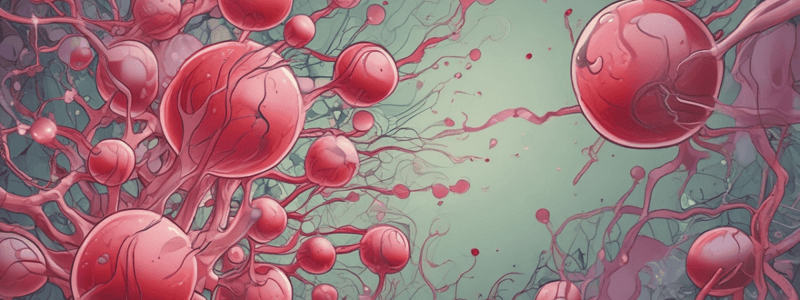Podcast
Questions and Answers
Which of the following is true regarding treating Immune Thrombocytopenic Purpura (ITP)?
Which of the following is true regarding treating Immune Thrombocytopenic Purpura (ITP)?
- Chronic ITP is a common disease
- Only medications can treat ITP effectively
- All patients react similarly to low platelet levels
- Focus should be on treating symptoms rather than platelet counts (correct)
What is a common symptom that matters most to ITP patients and their caregivers?
What is a common symptom that matters most to ITP patients and their caregivers?
- Frustration over treatment 'rollercoaster' (correct)
- Weight loss
- Muscle pain
- Vision problems
Why is understanding immunologic pathways important in the context of human disease?
Why is understanding immunologic pathways important in the context of human disease?
- It is irrelevant to disease treatment
- It helps in avoiding genetic disorders
- It only applies to rare diseases
- It allows for predicting patient symptoms (correct)
What aspect of daily life can be impacted by Immune Thrombocytopenic Purpura (ITP)?
What aspect of daily life can be impacted by Immune Thrombocytopenic Purpura (ITP)?
What is the significance of different patients reacting differently to low platelets in ITP?
What is the significance of different patients reacting differently to low platelets in ITP?
Which characteristic best describes Chronic Immune Thrombocytopenic Purpura (ITP)?
Which characteristic best describes Chronic Immune Thrombocytopenic Purpura (ITP)?
'Treat symptoms, not numbers.' What does this statement imply in managing Immune Thrombocytopenic Purpura (ITP)?
'Treat symptoms, not numbers.' What does this statement imply in managing Immune Thrombocytopenic Purpura (ITP)?
'Knowing which pathway, receptor or gene may be involved can help predict what symptoms that patient might experience.' What does this statement emphasize?
'Knowing which pathway, receptor or gene may be involved can help predict what symptoms that patient might experience.' What does this statement emphasize?
'Every immunologic pathway has the potential to be targeted by therapies that can treat human disease.' How does this statement impact disease treatment?
'Every immunologic pathway has the potential to be targeted by therapies that can treat human disease.' How does this statement impact disease treatment?
What is the most common age range for children to develop ITP?
What is the most common age range for children to develop ITP?
Which of the following is NOT listed as a sign or symptom of ITP?
Which of the following is NOT listed as a sign or symptom of ITP?
What is the prevalence of adults with ITP at any time?
What is the prevalence of adults with ITP at any time?
What are the red flags for alternate diagnoses in ITP?
What are the red flags for alternate diagnoses in ITP?
What do low platelet counts in children often indicate?
What do low platelet counts in children often indicate?
Which treatment goal is NOT listed as a general goal in managing ITP?
Which treatment goal is NOT listed as a general goal in managing ITP?
Which treatment option for ITP involves stopping antibody production by B cells?
Which treatment option for ITP involves stopping antibody production by B cells?
What laboratory finding in the diagnosis of ITP indicates normal cell morphology?
What laboratory finding in the diagnosis of ITP indicates normal cell morphology?
What is considered a 'red flag' indicating the need for further investigation in diagnosing ITP?
What is considered a 'red flag' indicating the need for further investigation in diagnosing ITP?
Which treatment option for ITP works by increasing platelet count without affecting the immune system?
Which treatment option for ITP works by increasing platelet count without affecting the immune system?
Flashcards are hidden until you start studying



